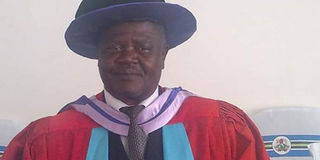Memories we have lost in professor’s sudden demise

Prof Chris Lukorito Wanjala. FILE | NATION MEDIA GROUP
What you need to know:
- At the event I did not have the slightest clue I was seeing the celebrated man-of-letters for the last time.
- He shared his treasured memories of the history of the English Department at my Alma mater, the University of Nairobi.
When you meet greatness, such I did last month during an event to celebrate the accomplishments of Prof Austin Bukenya, you may feel as overjoyed and overwhelmed as I was then.
I trembled because greatness filled the room at the All Africa Conference of Churches on Waiyaki Way.
As Prof Bukenya would later recount in his weekly Saturday Nation column on September 8, 2018, the event brought together an awe-inspiring constellation of literary luminaries.
It is however, noteworthy that in sampling the list of the who is who at the event, Prof Bukenya would start with Prof Chris Lukorito Wanjala, his bakoki (Bukusu for age-mate), whose death has now plunged the literary fraternity into bitter tears of mourning.
At the event I did not have the slightest clue I was seeing the celebrated man-of-letters for the last time. He shared his treasured memories of the history of the English Department at my Alma mater, the University of Nairobi.
HELPED LIBERATE LIBERATE LITERARY STUDIES
It is here that Prof Bukenya with others helped liberate literary studies from the narrow colonial nomenclature to the broad-based Department of Literature.
Prof Wanjala regaled us with hilarious anecdotes about the life and times of Prof Bukenya at University of Nairobi. I noticed that Prof Wanjala had lost none of the robust and vivaciousness of his demeanour as demonstrated in a presentation that pleased with its felicity and fluency, albeit with a raspy tinge in his voice.
Little did I know I was hearing Prof Chris Wanjala speak at a public function for the last time in my life.
I had a meal with him and we sat at the same table and talked. As usual he said many good things about my creative and critical works as well as journalism.
It reminded me of when I first met him soon after he had returned from Egerton University to University of Nairobi around 2000.
He had heard my voice on radio and had heard about my first novel Siku Njema and his remarks on my work were exhilarating and encouraging.
Little had changed in his typical generous and encouraging spirit, the sort of fuel that catalyses one to greater levels of achievement in the shark-infested literary waters.
As we shared that meal at AACC, I had no clue it was going to be the last meal ever with the man from Chesamisi, who had risen to be one of the most revered literary critics in East Africa.
INAUGURAL LECTURE
I attended his well-attended inaugural lecture at UoN nearly two decades ago and was among those who challenged the legitimacy of his mastery of East African literature, yet he had given Kiswahili literature a wide berth.
Prof Wanjala had given an incisive and illuminating analysis of the state of East African literature, but with little or no acknowledgment of Kiswahili literature.
I considered his response to my question about this sin of omission willy-nilly and wish washy. Little did I know I that he would subsequently take up the gauntlet and turn to analysing and teaching Kiswahili literature vigorously.
For instance, after meticulously perusing and teaching my childhood memoir, Nasikia Sauti ya Mama, he alerted me to an apparent factual error.
The studious professor discovered the late vice-president Michael Wamalwa Kijana, may not have attended St. Joseph’s Primary school, where I attended, as I claim in my book.
We then debated at length on autobiographical truth and historicity and whether or not autobiography is what actually happened or what the autobiographer claims happened. I sincerely do hope that his memoir Africa’s Bearded Men will posthumously see the light of day.
If US-based literary doyen Prof Evan Mwangi was a forerunner in the tendency to straddle the English and Kiswahili literary corpus in his criticism, Prof Wanjala has to be lauded for the shift to this “double consciousness” that East Africa literature invites.
HUMBLE
He was humble enough to realise that languishing in a linguistic cocoon in criticism was as complacent as it was anachronistic, and he, therefore, did not want to be literary dinosaur.
It pains me Prof Wanjala has gone and yet perhaps few or none of his profound public presentations are preserved in our archives.
We may be a nation that does not recognise greatness when we see it. I was there when Prof Wanjala debated with his nemesis Taban lo Lyong and David Mailu at the UoN in 2013. The hall was packed to capacity.
It was a historic event. And yet there was not a single TV camera in the room. I marvel at “the memories we lost,” as Prof Wanjala himself would have put it.
When an old man dies, a whole library has burnt down and in Prof Wanjala’s death, a thousand libraries have gone up in smoke, in the twinkling of a tearful eye.
***
Ken Walibora is a literary critic and creative writer. He teaches International Relations and Diplomacy at Riara University Nairobi




